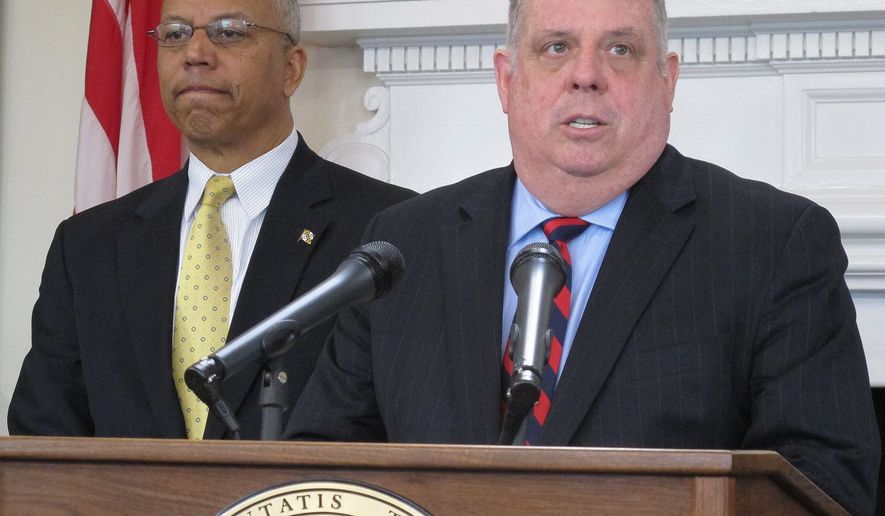ANNAPOLIS | Gov. Larry Hogan criticized the General Assembly Tuesday for its “reckless” spending while Democrats said they are not keen to give him more power over the state budget, the latest tense exchange over budgetary priorities between the first-term Republican governor and a Democratic-controlled legislature.
Mr. Hogan urged Democrats to advance a bill that would limit mandated spending in years when the state’s revenue is less than expected, which the House Appropriations Committee considered Tuesday afternoon. The legislation would give the governor’s office greater control over how to spend funds, which he said will offer some leeway when the state hits an economic rough patch.
“Unfortunately, it would appear that some members of the General Assembly are choosing to ignore fiscal responsibility altogether,” Mr. Hogan said at a news conference. “There seems to be a real disconnect between the legislative leaders and the rest of Maryland. All of the incredible work our team has done in the past year may be thrown out the window because of the reckless actions currently being contemplated by the legislature.”
A significant chunk of the budget is tied up in mandated spending, Mr. Hogan said, pointing to new proposed spending by Democratic lawmakers and saying the total cost is $3.7 billion.
In criticizing the legislature’s “reckless” spending, Mr. Hogan touted his unexpected election in 2014 and 70 percent approval rating as evidence of a mandate from voters to enforce stricter fiscal responsibility. He argued that Democratic leaders are “ignoring more than two-thirds of all Marylanders” who support him.
House Speaker Michael E. Busch, Anne Arundel Democrat, said Mr. Hogan’s high poll numbers are not indicative of good governing.
“If we had to govern by every time we thought someone was popular or not popular, we would be changing positions every 15 seconds,” Mr. Busch said, noting that lawmakers also were elected by their constituencies.
Democrats said Mr. Hogan’s “mandate relief” is unnecessary because the governor already has tools to get around spending mandates, such as the Budget Reconciliation and Financing Act (BRFA).
No budget for the past 10 years has fully funded all the mandates. Governors have used BRFAs, a companion to the budget, to reallocate money as they please. Governors also can withhold money that has been appropriated by legislators.
“The governor has the most powerful, strongest budget authority probably of anyone in these United States,” said Delegate Maggie McIntosh, chair of the House Appropriations Committee. “You saw that play out last year when we roped off money, found money for him to fund public education and he did not. So I guess I need to ask the question, ’Why does he need any more authority?’”
Legislators are not keen on losing the power the BRFA affords them to play with the budget. They can add policy riders to a bill, sometimes as leverage to ensure the governor will fund their priorities — a tactic that state Budget Secretary David Brinkley denounced for its lack of transparency.
“With the exception of rubber-stamping the budget, what is the role of the legislature in the budget process?” said Delegate Kirill Reznik, Montgomery Democrat.
Mr. Brinkley said the BRFA is “a short-term fix. And we’re looking for long-term solutions versus a short-term fix.”
Mr. Hogan’s “mandate relief” bill would protect four types of mandates: K-12 education, pension payments, the Rainy Day Fund and payments for the state debt.
But opponents said repealing all other mandates would hurt many necessary programs, including funding for colleges and mental health.
“Mandates for some reason got a negative connotation,” said Bernie Sadusky, executive director of the Maryland Association of Community Colleges. “It’s really about values and investments. In this case, it’s about the value of higher education.”
Other opponents included the Arc Maryland, which said necessary funding for disability and mental health programs would not be protected.
The tension between Democrats and Mr. Hogan comes as committees in both chambers inch toward deciding on his legislative package, made up largely of tax relief proposals.
On Friday, the House Economic Matters Committee voted down a bill to reduce corporate filing fees — the first of the Hogan bills to be voted on.
• Anjali Shastry can be reached at ashastry@washingtontimes.com.




Please read our comment policy before commenting.